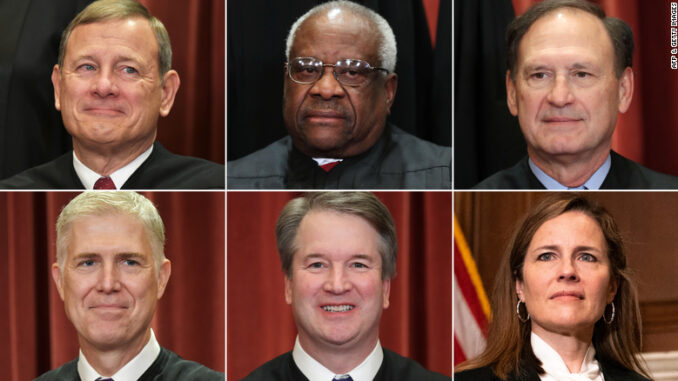
Washington (CNN)The Supreme Court agreed on Monday to decide next term whether Kentucky’s Republican attorney general can defend a controversial abortion-related law that had been struck down by a lower court, keeping the legal fight going.Attorney General Daniel Cameron sought to defend the law after the state’s Democratic administration declined to continue doing so. The 6th US Circuit Court of Appeals had barred Cameron from filing the appeal.The Kentucky law restricted an abortion procedure known as dilation and evacuation, which abortion rights advocates say is a routine second trimester abortion method. Kentucky Republicans have long sought to restrict abortion access, and the Supreme Court’s move on Monday highlighted the rift on the issue between Cameron and Democratic Gov. Andy Beshear.Forty-three states elect attorneys general, which sets up the possibilities that a state governor and the attorney general will disagree, said Steve Vladeck, CNN Supreme Court analyst and professor at the University of Texas School of Law.
Supreme Court conservatives want to topple abortion rights — but can’t seem to agree on how“The trickier question, and the one the Supreme Court agreed to resolve today, is when federal courts should allow one of those state actors to intervene if the other one declines to pursue an appeal,” Vladeck continued. “And although it comes in the politically fraught context of a challenge to Kentucky’s controversial abortion law, its implications are at once much broader and much more technical.”Lawyers for the American Civil Liberties Union representing the EMW Women’s Surgical Center and several doctors say the Kentucky law imposes an undue burden on the right to pre-viability abortion by “effectively” prohibiting the “standard second-trimester abortion method.”According to a 2017 article from the reproductive rights think tank the Guttmacher Institute, of the 11% of abortions that occur after the first trimester, about 95% of them are dilation and evacuation abortions.In court papers, they had urged the Supreme Court not to step in because the lower court did not undermine the attorney general’s authority “as a general matter” to defend Kentucky’s statutes. It simply said that in the particular case at hand the attorney general could have sought to intervene at an earlier date. If a motion seeking to intervene in a case is “untimely,” the lawyers argued, “intervention must be denied.”Andrew Beck, senior staff attorney at the ACLU Reproductive Freedom Project, asserted in a statement Monday “the Attorney General has shown that he will stop at nothing to prevent people from making their own decisions about a pregnancy,” Beck said, adding that “we will continue to work to make sure this ban never takes effect.”
Arkansas governor says he signed near-total abortion ban so Supreme Court can decide if it’s a ‘direct challenge’ to RoeCNN has reached out to Cameron’s office for comment. In court papers, Kentucky’s deputy attorney general, Barry Dunn, said that Cameron “has not only the power, but also the duty” to defend the law against legal challenge. “When another state official declines to appeal an adverse ruling, Kentucky law empowers the Attorney General to step in and continue defending state law on appeal,” Dunn wrote. Kentucky’s intra-state clash over abortion has been brewing for some time. In April 2020, Beshear vetoed a bill that would have allowed the Republican attorney general to potentially restrict abortion access during the coronavirus outbreak as well as requiring doctors to try to preserve the life of any infant born alive following an attempted abortion.



Be the first to comment